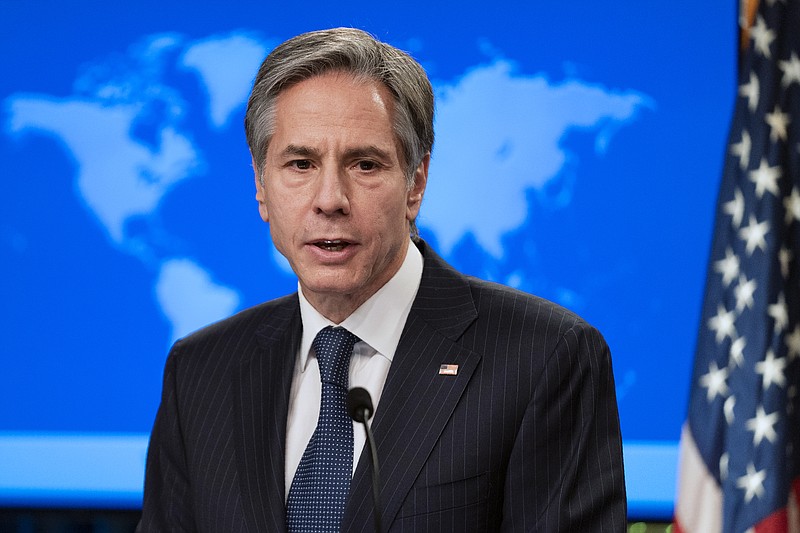U.S. Secretary of State Antony Blinken on Sunday criticized the Chinese government for a lack of transparency during the pandemic, particularly during "the early stages of covid," and he called for a more thorough investigation of the origins of the coronavirus.
[Video not showing up above? Click here to watch » https://www.youtube.com/watch?v=Z_oLAOuGrqw]
A report of a joint inquiry by the World Health Organization and China published last month did not conclusively establish how or when the virus began spreading, and it did little to allay Western concerns that the Chinese Communist Party bent the investigation to its advantage. Blinken, echoing those concerns, called on Beijing to make "a real commitment to transparency, to information sharing, to access for experts."
"I think China knows that in the early stages of covid, it didn't do what it needed to do," Blinken said on NBC's "Meet the Press." "One result of that failure is that the virus got out of hand faster and with, I think, much more egregious results than it might otherwise."
Blinken urged more investigation.
"We need to get to the bottom of this," he said of the virus's origins. "We need to do that precisely so we fully understand what happened, in order to have the best shot possible preventing it from happening again."
Blinken's remarks offered a more diplomatic approach than that of Trump administration officials who sought to blame China for the spread of covid in the U.S., often fanning the flames of xenophobia. Blinken's comments, however, also illustrated the Biden administration's willingness to convey skepticism of the official narrative coming from Beijing.
Blinken's predecessor, Mike Pompeo, asserted with little evidence months into the pandemic the notion that the coronavirus originated in a research laboratory in Wuhan, China. He pressed American spy agencies to hunt for evidence to support the theory, but most agencies remain skeptical that conclusive evidence of a link to a lab can be found.
Days before the WHO released its report, the director of the Centers for Disease Control and Prevention during the Trump administration also speculated that the virus originated in a lab in China. The former official, Dr. Robert Redfield, offered no evidence and emphasized that it was his opinion.
The WHO team of experts who investigated the origins of the virus in China dismissed the lab theory in their report as "extremely unlikely." But Dr. Tedros Adhanom Ghebreyesus, WHO's director-general, took the unexpected step of publicly raising doubts, saying the theory required further investigation and he was ready to deploy more experts to do so.
The Chinese Foreign Ministry and state media rejected criticism from the White House and others that Beijing had not been transparent during the WHO inquiry.
Chinese experts involved in the investigation "offered necessary facilitation for the team's work, fully demonstrating its openness, transparency and responsible attitude," a representative for the Chinese foreign ministry said in a statement last month. "To politicize this issue will only severely hinder global cooperation in study of origins, jeopardize anti-pandemic cooperation, and cost more lives," it said.
CHINA CRITIQUES ITS OWN SHOTS
Blinken's comments come as the head of the Chinese Center for Disease Control and Prevention conceded Saturday that the efficacy of Chinese coronavirus vaccines is "not high" and that they may require improvements, marking a rare admission from a government that has staked its international credibility on its doses.
Chinese vaccines "don't have very high protection rates," said the director of China's CDC, Gao Fu, at a conference Saturday in the southwestern city of Chengdu.
"It's now under formal consideration whether we should use different vaccines from different technical lines for the immunization process," Gao added
Gao said that one possibility was to adjust the dosage or increase the number of doses. He said another option was to mix vaccines that are made with different technologies. Experts say mixing vaccines, or sequential immunization, might boost effectiveness. Researchers in Britain are studying a possible combination of Pfizer-BioNTech and the AstraZeneca vaccine.
[Gallery not loading above? Click here for more photos » arkansasonline.com/412covid/]
Officials at the news conference didn't respond directly to questions about Gao's comments or possible changes in official plans. Another China CDC official, Wang Huaqing, said developers are working on messenger RNA-based vaccines, but gave no timeline for possible use.
Sinopharm, a state-owned firm, and Sinovac, a private company, use a conventional method of producing vaccines that contain inactivated germs, while other countries' offerings, including those by Pfizer-BioNTech and Moderna, rely on a newfangled technique that uses mRNA to stimulate an immune response.
Even though both Chinese drugmakers carried out mass clinical trials earlier than most other pharmaceutical companies last year, the data has not been still not been published in a peer-reviewed journal.
The effectiveness of a Sinovac vaccine at preventing symptomatic infections was found to be as low as 50.4% by researchers in Brazil, near the 50% threshold at which health experts say a vaccine is useful. By comparison, the Pfizer-BioNTech vaccine has been found to be 97% effective. Sinopharm has reported a 79% efficacy rate for its vaccine.
A Sinovac spokesman, Liu Peicheng, acknowledged varying levels of effectiveness have been found, but said that can be due to the age of people in a study, the strain of virus and other factors.
The mRNA vaccines are widely accepted as having higher efficacy rates, and Chinese pharmaceutical executives have said they are racing to catch up and master mRNA technology themselves.
Beijing has yet to approve any foreign vaccines for use in China, and Gao gave no details of possible changes in strategy, but he cited mRNA as a possibility.
"Everyone should consider the benefits mRNA vaccines can bring for humanity," Gao said. "We must follow it carefully and not ignore it just because we already have several types of vaccines already."
MANY DEPENDENT ON CHINA
Gao's comments come after the government has already distributed hundreds of millions of doses to other countries, even though the rollout has been dogged by questions over why Chinese pharmaceutical companies have not released detailed clinical trial data about the vaccines' efficacy.
The admission also undercuts other arms of the government, including its propaganda organs and diplomats, who have spent months touting Chinese vaccines as part of a soft-power push while aggressively sowing doubt about Western alternatives by questioning the efficacy and safety of mRNA technology.
China struck deals to supply many of its allies and economic partners in the developing world and boasted that world leaders -- including in Indonesia, Pakistan and the United Arab Emirates -- have taken the shots.
Gao's remarks, which appeared inadvertent and quickly spread through Chinese social media Saturday before being mostly censored, marked a departure from the rosy assessments of Chinese-made vaccines by the government. By Sunday, internet users were intentionally misspelling words in their posts while discussing Gao's comments to keep them from being removed.
On Sunday, the Global Times, a state-run newspaper that has led the way in pushing theories about the coronavirus originating from outside China, hit back at the "hyped up" reports of Gao's comments.
It quoted Gao as saying that his comments had been misunderstood and that he was speaking in general terms about how scientists, internationally, should improve their vaccine development.
"I was struck by what Gao said, not because it is significantly different from what we have already known but because it deviates from the official narrative on the effectiveness of Chinese and Western vaccines," said Yanzhong Huang, a senior fellow at the Council on Foreign Relations. "I think he was trying to push for the approval of the use of Pfizer-BioNTech vaccines in China and/or the acceleration of the development of China's own mRNA vaccines."
Even before Gao's comments, there had been discussion about whether the Chinese companies should tweak their formulations or vaccination regimen. Executives at Sinopharm said in March that they were assessing whether to include a third booster shot as part of their vaccine's standard administering procedure. The company said last week that it would begin clinical tests on a third vaccine.
More than 60 countries have approved at least one of China's vaccines for use. They have been in high demand, especially among lower-income countries, which have not been able to acquire the other vaccines.
However, there have also been signs that some countries were skeptical about the Chinese vaccines: The United Arab Emirates recently experimented with administering three shots of the Sinopharm vaccine, instead of two, over reports of low numbers of antibodies produced in some people, while Singapore has stockpiled but not used Sinovac shots.
In Turkey, where the Sinovac shot is in wide use, there has been little concern about its effectiveness. Rather, the worry has been that China won't be able to deliver the promised 100 million doses amid delays in shipments.
Brazil, Egypt and other nations also have been clamoring for more doses as China has throttled back exports in the face of domestic demand even as cases have been surging worldwide.
Information for this article was contributed by Chris Cameron of The New York Times; by Joe McDonald and Huizhong Wu of The Associated Press; and by Tom Schoenberg and Tony Czuczka at Bloomberg News (TNS).


